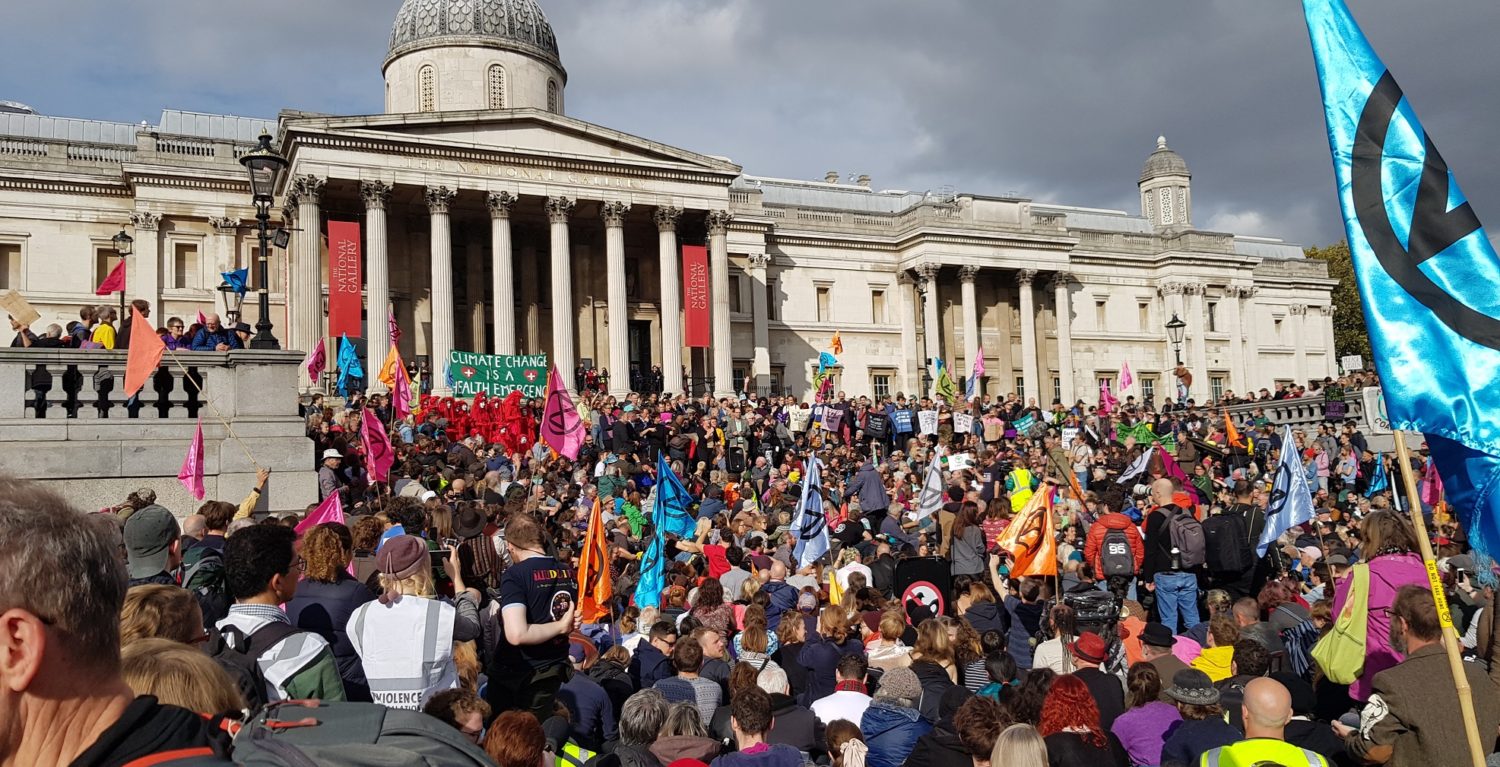A climate election
With a general election around the corner, Aranyo Aarjan looks at the impact XR protests have had on the climate change debate – and Labour’s approach.
As protest around the climate crisis grows, so does our understanding of it. A huge part of this is because of the global environmental movement, Extinction Rebellion (XR), which mobilised thousands of people across the country through two ‘global uprisings’ this year.
There have been roadblocks, sit-ins, speeches and police crackdowns as thousands took to the streets to protest government inaction on climate change. As 2019 draws to a close, it is important to reflect on what more could be done to strengthen the climate movement. And, with an election on the horizon, it’s also important to look at whether activists’ demands are being incorporated into Labour party policy.
Ever since the mass protests in April brought central London to a standstill, XR has certainly made a significant impact on the public consciousness surrounding climate change. But as many critics have noted, there have been shortcomings in the campaign’s approach, particularly in its framing of the issue of climate change which too often leaves out the voices of those who have been fighting it for many decades, primarily in the Global South. To remedy this, groups such as the Global Justice Rebellion have been redirecting the dominant narrative around climate change, particularly within XR, towards a politics of anti-capitalism, anti-colonialism and intersectionality.
It is vital we highlight the underlying systemic issues related to climate change, be it the problems with a growth-driven economy or the history of industrialisation or the extractivist practices of transnational mining and logging corporations. Furthermore, our climate justice movement must acknowledge the how climate change and migration are inextricably linked. This will be the unavoidable reality of the 21st century, particularly in the face of rising global fascism.
XR currently has three demands: 1) tell the truth, 2) act now, 3) set up a people’s assembly to lead the transition. But it is imperative that XR adopt a fourth demand for a ‘just transition’ to a carbon-free future – already adopted by XR US – that prioritises and is led by the voices of indigenous people, black people and poor people, marginalised communities who have long been suffering the consequences of climate change. We must foster a global network of solidarity between frontline groups resisting these processes.
The reason why the fourth demand is so important in this context is because it sets parameters for how that transition will happen and who will pay for it. It explicitly closes off interpretations such as Emmanuel Macron’s decision to increase fuel prices in France, which effectively places the burden on the working class, or the burgeoning ideology of eco-fascism, cited by both the El Paso and Christchurch shooters. Fundamental to the fourth demand is the understanding that climate change both exposes and exacerbates pre-existing intersections of power and inequality, whether economic, geopolitical or otherwise.
This is something the Labour campaign for a Green New Deal has similarly recognised, which is why it is so significant that Labour agreed to adopt it at conference this year. Fundamental to the Green New Deal is the idea that climate breakdown is a political crisis at the heart of capitalism that requires structural political solutions. “Labour’s Green New Deal will redistribute wealth and social goods to ensure that those who are already suffering do not pay the price for rapid decarbonisation,” says Eleanor Salter, co-lead of the Labour Green New Deal policy and research team. While XR has acted mostly as an awareness-raising movement so far, it is surely now time to turn towards concrete policy solutions like this.
Two of the Green New Deal’s standout policies are the repealing of all anti-union legislation, and the recognition that Britain’s early industrialisation, made possible by colonial subjugation and resource extraction, contributed to climate change. The Green New Deal thus pledges reparations in the form of cheap access to green technology developed by state investment to nations in the Global South.
Regarding repealing anti-union legislation, as Jeremy Gilbert, cultural and political theory professor at the University of East London says, historically, unions have been at their most open to change ‘at high-points of political confidence’. This is crucial when it comes to convincing millions to accept a transition to a new economy which will directly affect peoples’ working lives. The livelihoods of those working in carbon-heavy industries have to be safeguarded by guaranteeing a transfer to well-paying and secure green jobs and this will be made far easier with a restoration of collective bargaining power for unions. This is why all the big unions unanimously voted in favour of the Green New Deal at conference.
As for the topic of reparations, the mere mention of the word is a rarity in British society, let alone British politics, but these are the sorts of conversations XR activists need to be having. Britain has had a long-standing unwillingness to face up to its colonial past, its plundered wealth and the repression of its colonial subjects – as evidenced by its absence from the national curriculum. By explicitly acknowledging this historical truth, Labour could pave the way for a much-needed public debate.
The good news is that XR activists have responsed overwhelmingly positively to suggestions of a fourth demand for a ‘just transition’ to a carbon-free future and the need to rethink the dimensions of climate change. While the fight to adopt this fourth demand is yet to be won, Global Justice Rebellion saw a real desire from those participating in the most recent XR global uprising to keep the conversation alive. It is perhaps not a coincidence that these two processes are occurring simultaneously. Perhaps the public perception of what climate change means is truly changing.
Even though the shadow of Brexit looms large over the upcoming elections, if Labour plays its cards right, the Green New Deal could single-handedly bring them victory.
Photo credit: Aranyo Aarjan

